
Mušterija II
Kristina is a transgender sex worker in Serbia. She plays herself in an eponymous film that portrays her daily life with reticence in accordance with the rules of fiction. We’re in Kristina’s home with her. With camp elegance, she contentedly arranges ikebana in the luxuriant, baroque shade of her garden. The surprisingly shrill ringtone of her telephone disrupts the idyllic scene and Kristina reels off the prices of her services to the caller. Tracing an inner journey in the secret calm of churches and forests, the film also opens up a space of confession in its core, in frontal shots where Kristina tells her story. It does not, however, follow the path of repentance. On the contrary, it asserts the profound freedom of a modern woman, captured majestically in a bold portrait with strokes inspired by iconostases that tend towards the divine.

Vlada works as a truck driver during the NATO bombing of Serbia in 1999. Tasked with transporting a mysterious load from Kosovo to Belgrade, he drives through unfamiliar territory, trying to make his way in a country scarred by the war. He knows that once the job is over, he will need to return home and face the consequences of his actions.

